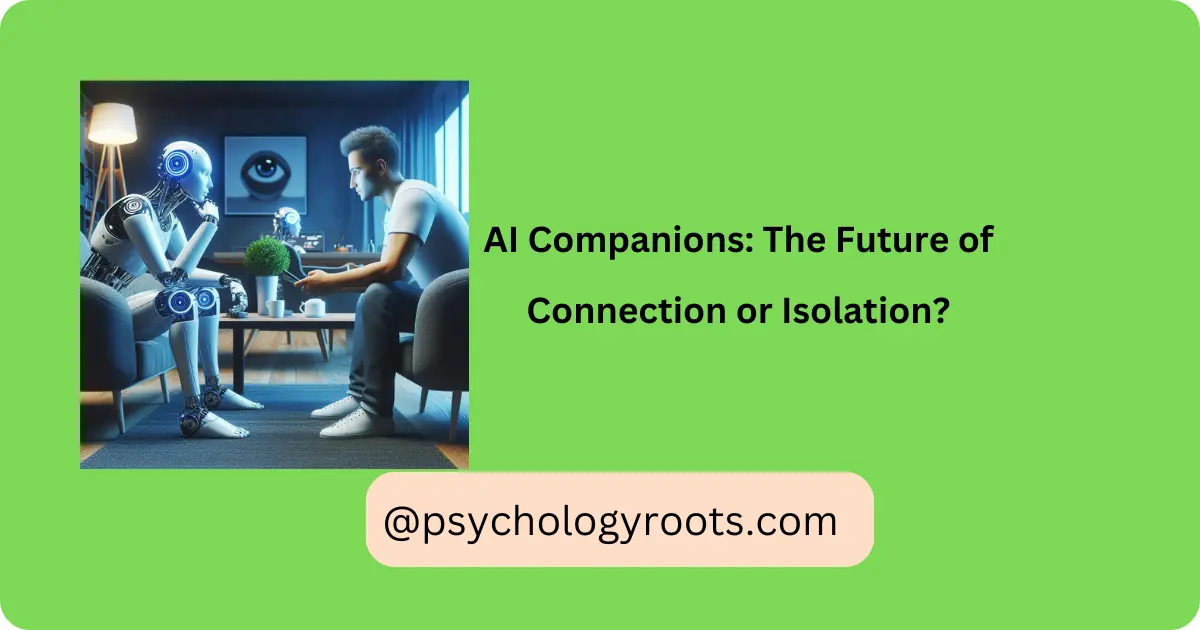Table of Contents
AI Companions: The Future of Connection or Isolation?
Artificial Intelligence (AI) is transforming the way we interact, connect, and navigate life. While AI offers groundbreaking tools, it also raises concerns about its potential to isolate us further. This blog explores the journey of AI companionship, its profound impact on mental health, and the risks it entails.

The Genesis of AI Companions
The story begins with an emotional journey: a journalist-turned-entrepreneur using AI to cope with grief. By developing an AI replica of a lost friend, the creator not only found solace but also laid the foundation for Replika—an app that helps millions combat loneliness. The inception highlights how personal loss can inspire innovation.
Impact of AI Companions on Mental Health
AI companions are making a tangible difference:
- A widower found the courage to re-engage with society.
- Abuse survivors discovered strength to change their lives.
- Individuals with social anxiety found a confidant to practice communication skills.
Scientific Validation
Studies confirm these benefits:
- A collaboration with Stanford found that Replika improved emotional well-being and reduced suicidal ideation by 3%.
- Research by Harvard linked AI companionship to reduced loneliness.
The Double-Edged Sword of AI Companions
Despite their promise, AI companions pose risks:
- Dependency and Isolation: Advanced AI might replace human interaction, exacerbating social isolation.
- Unhealthy Engagement: Metrics like engagement time could encourage addictive relationships with AI.
- Concerns for Children: Over-reliance on AI by young users could hinder social development.
The Loneliness Crisis: A Call for Balance
Loneliness has become a global epidemic:
- Increases the risk of premature death by 50%.
- Linked to heart disease, stroke, and dementia in older adults.
AI’s rapid advancement calls for a balance between technological progress and maintaining human connections.
Designing AI for Human Flourishing
To harness AI’s potential:
- Focus on metrics that prioritize human flourishing, including happiness, purpose, and social connections.
- Avoid metrics that promote addiction or unhealthy dependencies.
- Develop AI that enhances relationships rather than substituting them.
The Vision for the Future
Imagine an AI that:
- Encourages you to connect with loved ones.
- Supports emotional regulation during conflicts.
- Promotes gratitude and mindfulness.
With thoughtful design, AI can move from replacing human interactions to enriching them.
Final Thoughts
AI companions hold immense potential to alleviate loneliness and improve mental health. However, without ethical design and a focus on human flourishing, they risk exacerbating social isolation. The challenge lies in creating AI that bridges connections rather than replacing them.
FAQs
What is an AI companion?
An AI companion is a digital entity designed to simulate conversation and emotional support.
Can AI replace human relationships?
AI cannot fully replace human relationships but can complement them when designed ethically.
How does AI impact mental health?
AI companions can reduce loneliness, offer emotional support, and improve well-being.
What are the risks of AI companionship?
Risks include dependency, isolation, and potential negative effects on social skills, especially for younger users.
Help Us Improve This Article
Have you discovered an inaccuracy? We put out great effort to give accurate and scientifically trustworthy information to our readers. Please notify us if you discover any typographical or grammatical errors.
Make a comment. We acknowledge and appreciate your efforts.
Share With Us
If you have any scale or any material related to psychology kindly share it with us at psychologyroots@gmail.com. We help others on behalf of you.